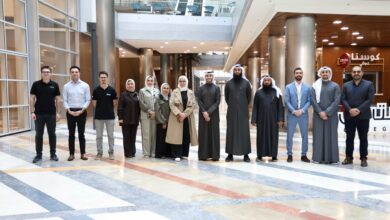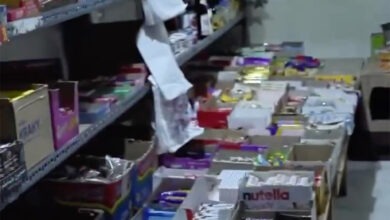Surging waste a health risk, an environmental hazard

THE TIMES KUWAIT REPORT
International Day of Zero Waste, which is observed each year on 30 March, raises awareness on the need to promote sustainable consumption and production patterns, as well as reduce, reuse, and recycle waste. The day also highlights the importance of strengthening waste management globally, and how zero-waste initiatives help address climate change and bolster Sustainable Development Goals.
Every year the world generates over 2.3 billion tonnes of household and commercial waste. Unless urgent remedial measures are implemented, including moderation in consumption, and reusing as well as recycling waste, this wastage could rise to 3.8 billion tonnes by 2050, warned UN Habitat, the United Nations program for human settlements and sustainable urban development.
In a statement ahead of International Day of Zero Waste, the UN agency said that considering waste is a significant contributor to greenhouse gas emissions (GHG), successful zero-waste initiatives could contribute to tackling the triple planetary crises of climate change, nature and biodiversity loss, and pollution, while also enhancing the health and wellbeing of people and the environment.
In October 2021, in its updated submissions to the UN Framework Convention on Climate Change, Kuwait committed to reduce the country’s GHG emissions, and to work towards zero-carbon emissions by 2060. Despite these emission pledges, the state has not accorded due priority to implementing a zero-waste policy that could significantly reduce its GHG emissions.
Increase in individual incomes and heightened development and modernization witnessed in Kuwait over recent decades, has led to consumption and waste generation patterns that are on the borderline of excessive. In a country of less than 4.8 million people, imprudent consumption has promoted a ‘throwaway’ culture that has generated a humongous amount of waste.
According to Kuwait’s environment trustee, the Environment Public Authority (EPA), the country generates in the range of 35 to 40 million tonnes of waste each year. Household waste accounted for around four percent of total waste, or 1.4 million tonnes in 2019. Meanwhile, per capita municipal solid waste (MSW), which includes household, as well as commercial and office waste, was around 1.6 kg per day — more than double the per capita global average of 0.74 kg per day.
Most of the waste in Kuwait comes from non-household economic activities, including debris from construction and demolition, as well as from mining and quarrying operations. Although the country is among the wealthiest in per capita terms and has the wherewithal to implement efficient waste management techniques, and undertake sustainable recycling measures, Kuwait continues to rely on outdated ‘dig and dump’ landfills to hold its growing pile of garbage.
The landfill sites, which are basically trenches dug in the desert, do not have any properly engineered protective barriers to prevent seepage of waste chemicals into surrounding soil, or down into the groundwater. The sites also do not have landfill gas collection mechanisms to stop harmful GHG gases, including carbon dioxide and methane from leaking into the air. Untreated landfill gas rising into the atmosphere contributes to increasing global warming.
The nearly 20 sq km of landfills in Kuwait are estimated to emit over 47,500 cubic meters of landfill gas per hour that produce a global warming potential of around 4.5 million tonnes of CO2 equivalents (CO2E) per year. To put this figure in perspective, the 4.5 million tonnes of CO2E is comparable to the CO2 emissions from driving over one million petrol-fueled passenger vehicles for a year in Kuwait.
International Zero-Waste Day seeks to encourage everyone to prevent and minimize waste, as well as promote a societal shift towards a circular and sustainable economy. A circular economy reduces material use, and redesigns materials, products, and services to be less resource intensive, as well as recycles waste to manufacture new materials and products.
Although nearly three-quarter of waste generated in Kuwait is recyclable, only 11 percent of total waste, around 4.8 million tonnes, was recycled in 2019. According to the United States Environmental Protection Agency, recycling one tonne of household waste, instead of sending it to a landfill, could save over 2.8 tonnes of CO2E emissions. Recycling just half of Kuwait’s annual waste could lead to substantial reductions in CO2E emissions.
It is commendable that despite lukewarm response from the authorities there are several ventures by individuals and groups in Kuwait to address the issue of waste recycling and reusing. One such venture, the non-profit Eco Star, which collects and recycles rubbish from homes, restaurants and schools, won for its young co-founder the ‘2020 Young Champion of the Earth’ award instituted by the United Nations Environment Programme (UNEP).
“We live in one of the richest countries in the world, yet we don’t have many sustainable solutions in the field of recycling. All of us should care more about the environment and about recycling,” said Fatemah Alzelzela, who along with her younger sister, Marwa co-founded Eco Star. Since its establishment in 2019, Eco Star has recycled more than 3,500kg of plastic, over 10,000kg of paper, and in excess of 120,000kg of metal.
Collecting and recycling MSW, as well as recovering and reusing landfill gas emission as a source of energy, can evidently contribute significantly to reducing Kuwait’s GHG emission footprint. In all fairness, it needs to be added that the authorities have in recent years shown a renewed focus on the environment, with reducing carbon emissions and improving air quality being part of the work plan outlined by the government for the legislative term 2023-2027.
While ensuing political changes have put the work plan on hold, the EPA appears committed to pursuing the goals of the work plan. In a statement last year, the acting Director-General of the Environment Public Authority, Eng. Samira Al-Kandari, affirmed that EPA intended to implement Item No. 4 of the government work program, which calls for the launch of a general framework for improving air quality and reducing carbon emissions and linking them to global indicators.
She disclosed that in pursuit of this goal, the Authority had signed a project with the Kuwait Institute for Scientific Research in cooperation with Harvard University for a period of three years. The project seeks to update national air quality standards and permissible limits for emissions from various sources; identify sources of air pollutants in Kuwait, and develop a national air quality strategy and action plans to improve air quality in Kuwait.
Eng. Al-Kandari also reiterated commitment to launch the Kuwait National Waste Management Strategy 2040 (KNWMS-2040) as part of the work plan. In this regard, she revealed that the EPA signed a four-year consulting contract with the German Fraunhofer Institute for Environment, Safety and Energy Technology. The strategy is designed to move Kuwait towards sustainable waste management and to decrease waste production and increase recycling and recovery of waste.
Lack of public awareness on waste and its deleterious effects on the environment contributes to the continued widespread waste witnessed in Kuwait. In a survey on waste in Kuwait, conducted by the Sabah Al-Ahmad Center for Environmental Training at EPA, when respondents were asked about their knowledge of the fate of waste in Kuwait, the most-selected answer was “I do not know”.
Low level of public awareness on the waste they generate could potentially lead to an increase in the current excessive consumption and improper waste disposal. Increasing public awareness is clearly critical to improving waste reduction and waste management to ensure the well-being of people and environment in Kuwait.












